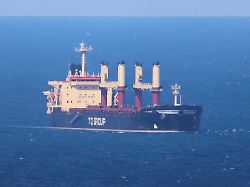“We’re not scared”
Selenskyj wants to continue shipping grain
07/17/2023, 8:07 p.m
Russia has rejected an extension of the grain deal. Ukraine is unimpressed and wants to continue exporting by sea. According to President Zelenskyy, there are inquiries from companies. It is unclear who will insure the ships in the future.
Ukraine wants to continue its grain exports across the Black Sea even after the end of the grain agreement announced by Russia. “Even without Russia, everything must be done so that we can use this Black Sea corridor,” said President Volodymyr Zelenskyy. “We are not afraid,” he told African journalists, according to a statement shared by his spokesman. “We’ve been approached by companies that own ships.” These would have shown themselves willing to continue the deliveries.
The agreement between Ukraine, Turkey and the UN is still in force without Moscow, he is quoted as saying. Only the separate agreement between Russia, Turkey and the UN was terminated. Zelensky did not say how the ships and their goods should be insured in the war zone.
The Kremlin had previously declared the grain agreement over. Kremlin spokesman Dmitry Peskov said in Moscow a few hours before the expiry of the existing agreement that Russia would revive the agreement “immediately” as soon as the agreements with the Russian side were kept.
The agreement signed in Istanbul in July 2022 has already been extended twice; it allows Ukraine to export grain and fertilizers through the Black Sea from three ports around Odessa. Last year, more than 1,000 ships transported almost 33 million tons of grain from Ukrainian ports. After the Russian attack on Ukraine almost 17 months ago, sea exports were initially stopped for security reasons. The resumption of grain exports via the sea corridor helped bring down food prices around the world.
Moscow had been threatening to let the agreement expire for several weeks. The Russian side complains about the restrictions on the export of fertilizer and its own agricultural products, which were also agreed in connection with the agreement.
The Industry portal Agrarheute.com reports that wheat prices have been rising since Friday in anticipation of Russia’s decision. However, heat and drought in other growing regions of the world also contribute to the increase.
Citing the Joint Coordinating Body (JCC), which oversees the implementation of the agreement, it said agricultural products were shipped to 45 countries on three continents as part of the agreement. Accordingly, 46 percent of exports went to Asia, 40 percent to Western Europe, 12 percent to Africa and one percent to Eastern Europe. Almost half of the deliveries were corn. The proportion of wheat was 27 percent. The rest is sunflower flour, sunflower oil, barley and rapeseed.
According to JCC information, the last ship left the port city of Odessa on Sunday and drove via Istanbul and on to the Netherlands. It was loaded with 38,800 tons of agricultural products.
